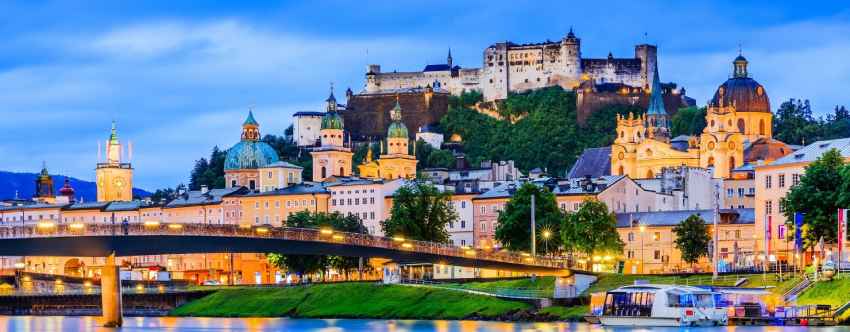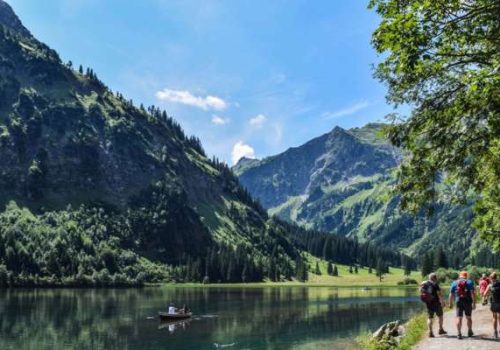Living and Working in Austria
Information & guidance about seasonal jobs in Austria
Seasonal jobs in Austria
Austria, famous for its stunning alpine scenery, classical music heritage, and vibrant culture, is a top destination for expats. Renowned for its high standard of living, excellent healthcare, and progressive labor laws, Austria offers a lifestyle that balances career opportunities with leisure. This guide provides an in-depth look at living and working in Austria, covering everything from salaries and job opportunities to living costs and seasonal work.
Working in Austria
Working Conditions in Austria
Austria’s structured and employee-friendly work environment ensures fair treatment and an enviable work-life balance. A standard workweek is 40 hours, though many industries have adopted shorter weeks, such as 37 or 38 hours. Working hours generally run from 8 am to 5 pm, including a one-hour lunch break.
Employees in Austria enjoy 25 days of paid leave annually, along with 13 public holidays, making the country one of the most vacation-friendly nations in Europe. A unique feature of Austrian employment law is the mandatory 13th and 14th salaries, which are distributed as vacation bonuses in June and Christmas bonuses in November. These additional payments provide a financial cushion and boost employee satisfaction.
Austrian workplace culture values punctuality and professionalism, with meetings following structured agendas. While relationships between colleagues are respectful, the tone tends to remain formal, especially in corporate settings. Employers emphasize efficiency and results but also understand the importance of personal well-being, encouraging employees to leave work on time—a stark contrast to the high-pressure environments of cities like London or New York.
Job Opportunities in Austria
Austria boasts a robust and diverse economy, offering job opportunities across industries like finance, technology, healthcare, manufacturing, and tourism. Vienna, the capital, is a hub for international organizations, finance, and diplomacy, making it a prime location for expats with backgrounds in banking, consulting, or public administration.
The tourism industry is another cornerstone of Austria’s economy, especially in Salzburg, Innsbruck, and Tyrol, where roles in hotels, restaurants, and event planning are plentiful. Similarly, Austria’s renewable energy and engineering sectors, particularly in Graz and Linz, attract professionals in IT, engineering, and environmental sciences.
For those in education, teaching English is a common route for expats. International schools and language academies frequently hire native speakers, while universities like the University of Vienna offer opportunities for researchers and administrative professionals.
While English is widely spoken in professional settings, proficiency in German significantly boosts job prospects, particularly in customer-facing roles or smaller businesses. Non-EU citizens can apply for a Red-White-Red Card, a visa scheme that streamlines the process for skilled workers to live and work in Austria.
Summer Jobs in Austria
Summer jobs are abundant in Austria, particularly in the hospitality and adventure tourism sectors. With its pristine lakes, mountain trails, and cultural festivals, Austria attracts millions of tourists during the summer, creating a high demand for seasonal workers.
Those working as waitstaff, receptionists, or chefs in popular tourist areas like Carinthia or Salzburg can earn between €1,500 and €2,000 per month, often with free accommodation and meals included. Adventure sports instructors, such as hiking guides or rafting instructors, can expect monthly earnings of €1,800 to €2,500, depending on experience and qualifications.
Many summer jobs offer added perks, such as discounts on recreational activities or access to cultural events, making them particularly appealing to students and travelers looking to earn while exploring Austria.
Winter Jobs in Austria
Winter transforms Austria into a snowy paradise, with its famous ski resorts becoming bustling hubs for seasonal workers. The Alps, including regions like Tyrol, Vorarlberg, and Salzburg, are especially popular for winter jobs in hospitality and sports.
Ski instructors are among the most in-demand roles, with salaries ranging from €2,000 to €3,500 per month, depending on qualifications and certifications. Hotel staff, chalet hosts, and rental shop assistants typically earn €1,800 to €2,500 per month, with many employers offering free lodging and meals.
Winter jobs are not just financially rewarding but also provide a chance to experience the Austrian Alps lifestyle, including skiing, snowboarding, and après-ski activities.
Salaries in Austria
Austria offers competitive salaries, especially in skilled professions. The average monthly gross salary is approximately €3,500, though this varies by industry and experience. For example, IT professionals and engineers can earn between €4,500 and €6,500, while entry-level positions in customer service or tourism pay closer to €1,800 to €2,500.
While salaries in Austria might not match those in Switzerland or Germany, the lower cost of living in certain regions and the mandatory bonuses help create financial stability.
Income Tax in Austria
Austria’s progressive tax system means higher earners pay more, with income tax rates ranging from 20% to 55%. Social security contributions are also mandatory, covering healthcare, pensions, and unemployment benefits. Taxes are automatically deducted from salaries for employees, while freelancers and business owners must manage their tax filings independently.
Expats from countries with double taxation treaties with Austria benefit from reduced tax burdens, ensuring they don’t pay taxes on the same income in multiple countries.
Working Culture in Austria
Austrian work culture emphasizes efficiency, order, and respect. Employers value employees who are punctual, reliable, and proactive, while teamwork and collaboration are integral to most workplaces. Although the atmosphere can be formal, it’s also highly supportive, with an emphasis on achieving quality results without sacrificing work-life balance.
Flexibility is becoming more common, particularly in industries like IT and media, where remote work and flexible hours are increasingly the norm. Networking is important, and building relationships with colleagues and local professionals can significantly enhance career opportunities.

Living in Austria
Benefits of Living and Working in Austria
Living in Austria offers an enviable combination of high quality of life, excellent healthcare, and cultural richness. Austria’s universal healthcare system ensures all residents have access to affordable medical services, while its public education system is among the best in Europe.
Expats appreciate Austria’s safety, cleanliness, and stunning natural landscapes, from alpine peaks to serene lakes. The country’s central location in Europe makes it ideal for travel, with neighboring countries like Germany, Italy, and Switzerland easily accessible.
Accommodation in Austria
Housing costs in Austria vary significantly depending on location. In Vienna, a one-bedroom apartment in the city center costs between €800 and €1,200 per month, while similar apartments in smaller cities like Graz or Innsbruck range from €600 to €900. Suburban areas offer more affordable options, with rents starting at €500.
Utilities, including electricity, heating, and water, add around €150 to €250 per month, depending on the season. Expats often use platforms like Willhaben or work with real estate agents to find suitable accommodation.
Cost of Living in Austria
Austria’s cost of living is moderate compared to Western Europe. Monthly expenses for a single person range from €1,200 to €2,000, depending on lifestyle and location. Groceries typically cost €250 to €350 per month, with affordable options available at supermarkets like Spar and Hofer.
Dining out is reasonably priced, with a meal at a mid-range restaurant costing around €12 to €20. Public transportation is efficient and affordable, with monthly passes in Vienna costing €51, offering unlimited access to buses, trams, and the metro.
Where to Live in Austria
Austria offers a variety of living environments to suit different preferences. Vienna, the capital, is ideal for those seeking cultural attractions, career opportunities, and urban amenities. Salzburg and Innsbruck are perfect for outdoor enthusiasts, with their proximity to the Alps and vibrant local communities. Smaller towns like Graz offer a quieter, more affordable lifestyle without sacrificing modern conveniences.
Public Transport in Austria
Austria’s public transport system is one of the best in Europe, featuring reliable buses, trams, and trains. Monthly passes are affordable, with Vienna offering unlimited travel for just €51. The national train service, ÖBB, connects major cities and towns, making it easy to explore the country.
What Not to Miss in Austria
Austria’s rich cultural heritage means there’s always something to discover. From Vienna’s State Opera House and Schönbrunn Palace to Salzburg’s birthplace of Mozart, the country is a haven for art and music lovers. Outdoor enthusiasts will enjoy exploring the Austrian Alps, Hallstatt, and Lake Wolfgang.
Seasonal festivals, like the Vienna Christmas Markets and the Salzburg Festival, provide opportunities to immerse yourself in Austrian traditions, cuisine, and hospitality.




